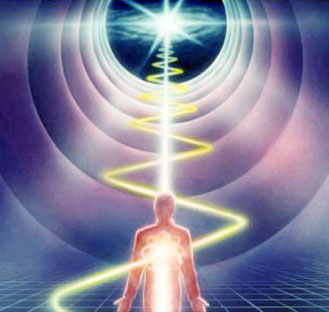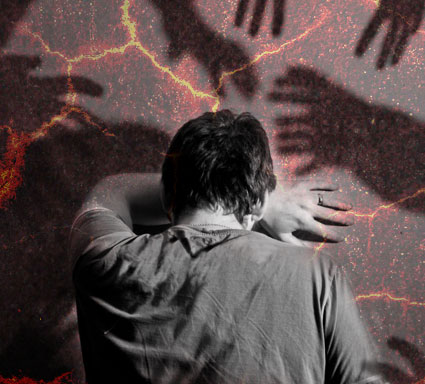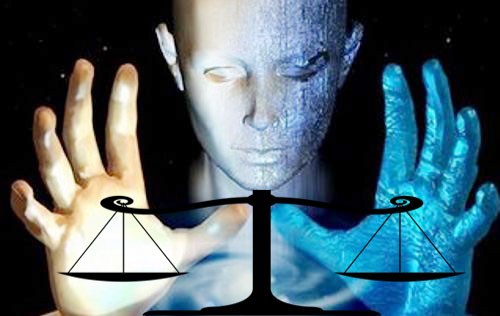 by Ernest L. Norman
by Ernest L. Norman
Now we have obtained something of a constructive picturization in the development of the Superconscious, and how this  continuous development enables a person to progressively reinstate himself into a higher and higher dominion of spiritual life; how it does, in a sense, intercede into numerous earth-life dispensations to the extent that we can say we have personal intercession. We have guidance and motivation which is beyond the normal range of human understanding, and we have a correspondingly greater degree of perfection in our daily lives. If we can look further into the future to a person who has so developed, we can more ultimately envision such a person as having mental capacities which are quite beyond anything which could be properly understood by the human race. This was exemplified by the Nazarene almost two thousand years ago.
continuous development enables a person to progressively reinstate himself into a higher and higher dominion of spiritual life; how it does, in a sense, intercede into numerous earth-life dispensations to the extent that we can say we have personal intercession. We have guidance and motivation which is beyond the normal range of human understanding, and we have a correspondingly greater degree of perfection in our daily lives. If we can look further into the future to a person who has so developed, we can more ultimately envision such a person as having mental capacities which are quite beyond anything which could be properly understood by the human race. This was exemplified by the Nazarene almost two thousand years ago.
Conversely, such a development can also take place with the subconscious and this in itself is the basic understanding for the development of the lower astral regions, which are described by Dante in his immortal poetry called “The Inferno”.  Actually, such places are in a pure sense or a material sense non-existent. They exist as oscillating entities of consciousness within the confines of the subconscious or the astral self. If a person like John, for instance, had developed the material life to that degree where it became the dominant and the subversive elements in his existence so that when he went into the spiritual worlds, these same subversive materialistic elements would have been reinforced by certain additives which were possible under certain conditions, we can then envision John as being progressively inclined downward into an ever-increasingly larger dimension of negative interpolations of consciousness. These are the true pits of hell, for in the conscious realizations which form between the mental consciousness of the psychic anatomy and the subconscious, and providing that the subconscious had developed to that enormous proportion, that it is the dominating factor in that relative oscillating process, then we can quite easily see that all of the hellish nightmares pictured in such prose as was given by Dante, or preached by the religionist can be a factual reality to such a person who has so counter-developed his evolution.
Actually, such places are in a pure sense or a material sense non-existent. They exist as oscillating entities of consciousness within the confines of the subconscious or the astral self. If a person like John, for instance, had developed the material life to that degree where it became the dominant and the subversive elements in his existence so that when he went into the spiritual worlds, these same subversive materialistic elements would have been reinforced by certain additives which were possible under certain conditions, we can then envision John as being progressively inclined downward into an ever-increasingly larger dimension of negative interpolations of consciousness. These are the true pits of hell, for in the conscious realizations which form between the mental consciousness of the psychic anatomy and the subconscious, and providing that the subconscious had developed to that enormous proportion, that it is the dominating factor in that relative oscillating process, then we can quite easily see that all of the hellish nightmares pictured in such prose as was given by Dante, or preached by the religionist can be a factual reality to such a person who has so counter-developed his evolution.
At this point we must again resort back to one of the basic elements of our introspection with the Infinite—that the Infinite does present the possibility of all things which can be conceived by human configurations and transpositions and  environmental factors. The proposition of selectivity then becomes increasingly apparent and more demanding as the burden of our own material world or its impregnations of karma become more apparent to us; the demand increases that we must select something either environmental or spiritual in nature, or any other relevant factors which can begin to discharge these different negative karmic intents which are oscillating into our conscious. The proposition of selectivity, therefore, is of paramount importance. It is the keystone in the arch of progression or retrogression. Any person here or hereafter is immediately confronted with this same proposition of selectivity.
environmental factors. The proposition of selectivity then becomes increasingly apparent and more demanding as the burden of our own material world or its impregnations of karma become more apparent to us; the demand increases that we must select something either environmental or spiritual in nature, or any other relevant factors which can begin to discharge these different negative karmic intents which are oscillating into our conscious. The proposition of selectivity, therefore, is of paramount importance. It is the keystone in the arch of progression or retrogression. Any person here or hereafter is immediately confronted with this same proposition of selectivity.
In a sense then, because God is the Infinite Intelligence, God is not emotionally inclined toward any person. God is therefore assumed correctly to be all-forgiving; that is, God can and will reinstate us in a healthy evolution, in a sense of the word, provided we have enough intelligence to realize where we are on the scale of evolution, providing we have enough will and determination to about-face and start a progressive climb back in the right direction. In this sense, God as the Infinite makes no demands from us. It is inviolate in Its supreme and most ultimate introspection. It is also the substance of all things. It cannot be destroyed even though we personally may attempt to destroy our own facsimile of the Infinite.
So it is thus: even if a person does in his mental capacity and in his astral developments literally and figuratively descend to the pits of hell, he can at any time, if he so realizes, if he so makes the necessary determinants, if he exercises the will and determination, he can begin his climb back out of these illusionary materialistic configurations which have created his hell, and he can again reinstate himself in a healthy and progressive evolution.
Likewise anyone who has ascended the scale of an evolution to some of the more advanced points in these Higher Spiritual Worlds, conversely, can descend. The moment that he becomes lax in his equilibriums, in his evaluations, and in his personal introspections, his oscillations with, or his constructiveness with the Infinite, when he begins to personalize these, when he begins to lose the entire abstraction of Infinity which enabled him to so progress, if in the slightest degree he becomes more personally rhetorical in his spiritual life, then he will begin his plunge downward. And there are fallen angels, just as there are reincarnated devils who now live great and wonderful spiritual lives.
Here again is one of the more abstract evaluations of spiritual consciousness and apparently even more infinite than is Infinity itself, for the numbers, the degrees and the differences, the personalities involved would be so vast and so infinite as to defy a constructive analysis, except that we constantly resort to basic principles of evolution; we classify and reclassify, we diagnose and we analyze. The motivation of life must be thoroughly and completely understood, otherwise we are waylaid by the material apparition, the necessity of our own personality, the demand of our ego. These factors are all apparent; they are ever ready to destroy us. If they are not properly compensated for, if they are not equalized, and if they are not so introspected as elements in evolution, then they become things which are personally attached to us in a way in which we do not recognize them; we cannot become objective to them.
Excerpt from Tempus Procedium
See Part III here. See Part V here.




